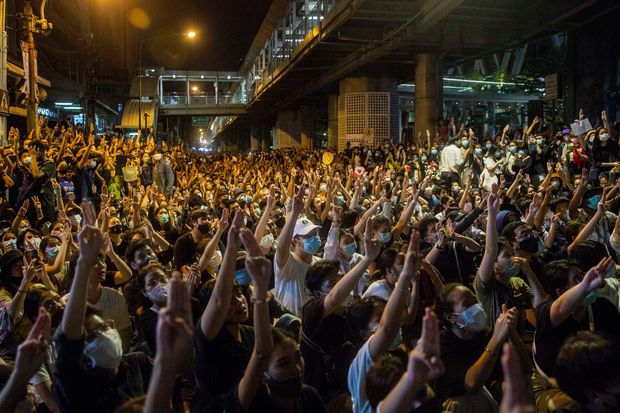
Pro-democracy protesters in central Bangkok on Thursday.
Photo: Lauren DeCicca/Getty Images
SINGAPORE—Thailand issued an emergency decree banning gatherings of more than five people, seeking to end student-led protests that have grown bolder in challenging the government and the country’s powerful monarchy.
Thursday’s decree came a day after thousands of people gathered in the capital, Bangkok, and marched to the government headquarters, where they camped out overnight. At one point, as the queen’s motorcade passed, protesters jeered and chanted “the people’s taxes,” a reference to the royal family’s luxurious lifestyle.
Many young activists have expanded their targets to take aim at the wealth and secrecy of the monarchy, which is shielded from criticism by a strict lèse-majesté law that carries prison terms of up to 15 years for insulting the king or his family.
King Maha Vajiralongkorn, who took the throne upon the death of his widely revered father in 2016, controls a vast fortune and spends most of his time in southern Germany.
Wednesday’s events marked the royal family’s first direct exposure to the public discontent that has grown in their absence—they arrived in Thailand this week for a visit—fueled by what protesters say is an erosion of democratic freedoms, an economy crippled by coronavirus lockdowns and widening inequality. The palace hasn’t commented on the protests.
The months of protests have presented three core demands: dissolution of parliament, a new constitution and an end to harassment of government critics. Some protesters have gone a step further, calling for curtailing the monarchy’s powers and auditing its books.
Police began arresting protesters around 5 a.m. Thursday and cleared the area around the Government House within a few hours. Prominent protest leaders Arnon Nampa and Parit Chiwarak were among the more than dozen people detained, according to the legal-aid group Thai Lawyers for Human Rights, which represents many of the activists.
On Thursday evening, thousands of people rallied in central Bangkok in defiance of the ban on large public gatherings. Many shouted chants of “Free our friends,” in reference to the activists arrested earlier. The demonstration wound down peacefully after 10 p.m. Organizers called for further demonstrations on Friday.
The government announced the state of emergency in the Royal Gazette, saying it was prompted by “an action that had an impact on a royal motorcade,” accusing protesters of “creating turbulence, chaos and disorder.”
Charles Santiago, a member of Parliament in neighboring Malaysia and chairman of the advocacy group Asean Parliamentarians for Human Rights, called the decree “an excuse to shut down the peaceful protests.”
“The thousands that have taken to the streets in Bangkok, and nationwide, have done so peacefully, and are fully entitled to raise concerns about the current state of democracy in Thailand,” Mr. Santiago said.
Wednesday’s mostly peaceful demonstration included a few minor confrontations between antigovernment protesters and supporters of the military-royalist establishment. These counterprotesters, wearing yellow T-shirts symbolic of Thailand’s conservative elite, arrived in trucks throughout the day. Videos circulated on social media appeared to show them hitting some antigovernment protesters with sticks.
Street protests are common in Thailand, but the current demonstrations are different from those in the past, which were typically led by two rival political camps and pitted rural poor against urban elite. The current protest movement comprises a broad coalition of mostly young, pro-democracy activists who say they are fed up with the military’s outsize influence on politics. Prime Minister Prayuth Chan-ocha is a former army leader who led a coup in 2014 and then won a 2019 election criticized by the opposition as unfairly favoring his military-backed party. The government has denied these allegations.
Student groups have spearheaded the demonstrations for months, mobilizing youth through online campaigns and drawing the largest crowds of protesters seen in the country since before the 2014 coup.
A person showed a protest salute as thousands demonstrated in Bangkok.
Photo: athit perawongmetha/Reuters
—Wilawan Watcharasakwet in Bangkok contributed to this article.
Write to Feliz Solomon at feliz.solomon@wsj.com
Copyright ©2020 Dow Jones & Company, Inc. All Rights Reserved. 87990cbe856818d5eddac44c7b1cdeb8
Appeared in the October 16, 2020, print edition as ‘Thailand Limits Gatherings as Protests Grow.’
